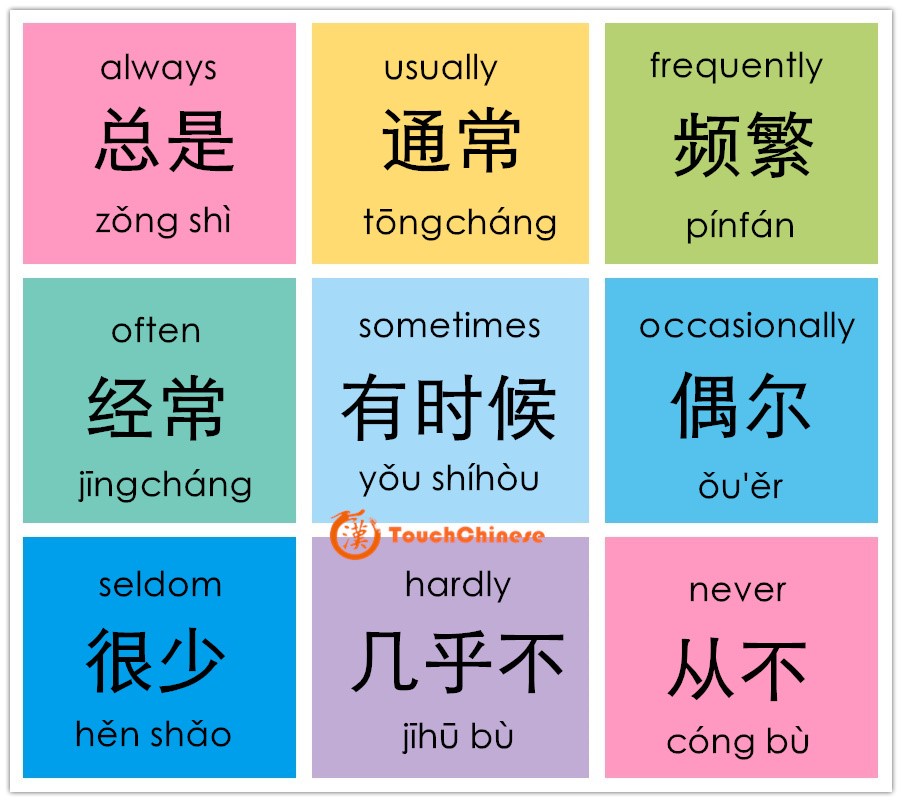Just like in English, there are also a series of adverbs in Chinese to state the frequency of activities. They are often put before the verbs and after the subjects. Below are some of these adverbs and how to properly use them.
1. 总是
(zǒng shì) all the time, always
e.g.
他总是很晚下班。(Tā zǒng shì hěn wǎn xiàbān.)
He always gets off work late.
他们见面总是吵架。(Tāmen jiànmiàn zǒng shì chǎojià.)
They always quarrel when they meet.
2. 通常
(tōngcháng) usually
e.g.
我周末通常不去公司。(Wǒ zhōumò tōngcháng bù qù gōngsī.)
I usually don’t go to the company on weekends.
我家早上通常吃面条。(Wǒjiā zǎoshang tōngcháng chī miàntiáo.)
My family usually eats noodles in the morning.
3. 频繁地
(pínfán de) frequently
e.g.
最近她频繁外出吃饭。(Zuìjìn tā pínfán wàichū chīfàn.)
Recently she has been eating out frequently.
我在这两个国家频繁往来。(Wǒ zài zhè liǎng gè guójiā pínfán wǎnglái.)
I travel frequently between these two countries.
4. 常常 / 经常
(chángcháng/ jīngcháng) often
e.g.
他常常挖苦别人。(Tā chángcháng wākǔ biérén.)
He often scorns others.
老人们经常想起几十年前的生活。(Lǎorénmen jīngcháng xiǎngqǐ jǐ shí nián qián de shēnghuó.)
Old people often think of life decades ago.
5. 有时候
(yǒu shíhòu) sometimes
e.g.
我们有时候会对最亲的人没耐心。(Wǒmen yǒu shíhòu huì duì zuì qīn de rén méi nàixīn.)
We sometimes have no patience with the closest people.
有时候要到谷底,才会慢慢变好。(Yǒu shíhòu yào dào gǔdǐ, cái huì màn man biàn hǎo.)
Sometimes things have to fall apart to make way for better things.
6. 偶尔
(Ǒu’ěr) occasionally, once in a while, now and then
e.g.
我们分手后还是会偶尔见面。(Wǒmen fēnshǒu hòu háishì huì ǒu’ěr jiànmiàn.)
We still meet occasionally after we broke up.
结婚后,夫妻也会偶尔吵架。(Jiéhūn hòu, fūqī yě huì ǒu’ěr chǎojià.)
After getting married, couples would occasionally quarrel.
7. 很少
(hěn shǎo) seldom, rarely
e.g.
我们虽然是亲戚,但是很少联系。(Wǒmen suīrán shì qīnqi, dànshì hěn shǎo liánxì.)
Although we are relatives, we seldom make contact with each other.
工作后他就很少回家了。(Gōngzuò hòu tā jiù hěn shǎo huí jiāle.)
He seldom went home after work.
8. 几乎不
(jīhū bù) hardly, scarcely
e.g.
人们几乎不抱什么期望。(Rénmen jīhū bù bào shénme qīwàng.)
People hardly have expectations.
我几乎不敢开口说话。(Wǒ jīhū bù gǎn kāikǒu shuōhuà.)
I hardly dare talk.
9. 从不
(cóng bù) never
e.g.
我从不开车去城里。(Wǒ cóng bù kāichē qù chéng lǐ.)
I never drive to the city.
我无论何时开口,从不夸夸其谈。(Wǒ wúlùn hé shí kāikǒu, cóng bù kuākuāqítán.)
Whenever I talk I don`t half waffle on.

